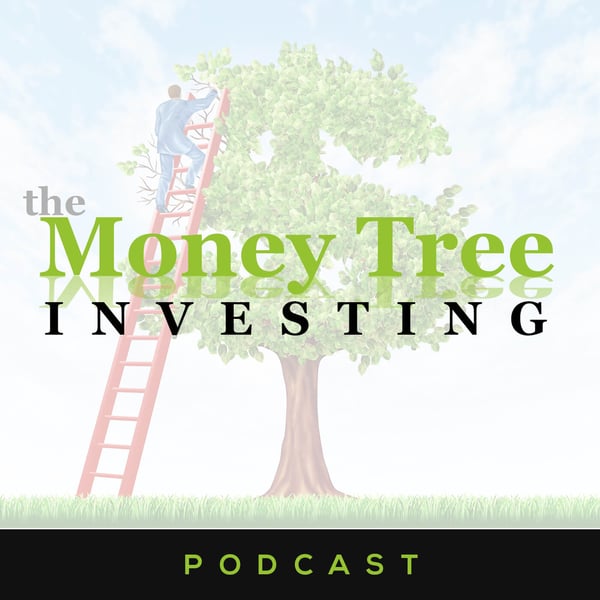Get Your Masters In Personal Finance Education In 30 Minutes Or Less
Money Tree Investing
Money Tree Investing Podcast
4.6 • 658 Ratings
🗓️ 11 October 2024
⏱️ 74 minutes
🧾️ Download transcript
Summary
Jeff Hulett shares how a proper personal finance education can build the habits that grow lifelong wealth. Our cognitive biases impact financial decision-making, often work against us. He highlights the role of habits and commitment devices in overcoming these biases, while also discussing the dangers of modern marketing and the manipulation of data. We also touch on how evolutionary biology still influences our financial behaviors today.
We discuss...
- Jeff Hewlett shares his background in finance, mathematics, economics, and experience in banking and consulting.
- Jeff discusses his involvement in AI, machine learning, and how these technologies have been evolving over decades.
- He talks about his current role leading Personal Finance Reimagined, a platform focused on decision-making and financial education.
- How wealth distribution challenges are attributed to evolutionary biology and consumerism.
- Jeff emphasizes the importance of creating good financial habits and using commitment devices, such as robo-advisors.
- AI and its impact on decision-making, especially its potential for persuasion.
- Jeff highlights the significance of aligning decision processes with natural human tendencies, like binary decisions.
- How the U.S. education finance system preys on availability bias, deferring loan payments to the future while hiding present costs.
- College prices are excessively high, leading to concerns about the return on investment (ROI) for students.
- The value of a college degree is more about demonstrating the ability to work hard and sustain effort over four years.
- Community college can be a cost-effective route to a degree, demonstrating both financial savvy and resilience.
- There's a cognitive bias known as "time discounting" that leads people to struggle with understanding the compounding value of time.
- Confirmation bias affects political and social views, often reinforced by media echo chambers.
- Media, both legacy and social, plays a significant role in shaping biased worldviews, sometimes feeding incomplete or selective information.
- There's a growing generational divide in media trust, with older generations more likely to trust media than younger ones.
- The rise of narrowcasting in media has led to the creation of echo chambers where people only hear confirming viewpoints.
- Consumers of free media or social platforms are often the "product" being monetized, even when they think they aren’t paying for content.
- AI and technology add to the complexity of discerning truth, as biases are baked into data sources, and deep fakes further obscure reality.
- The challenge for society is figuring out how to discern accurate information amid pervasive bias and misinformation.
For more information, visit the show notes at https://moneytreepodcast.com/personal-finance-education-jeff-hulett-650
Today's Panelists:
- Kirk Chisholm | Innovative Wealth
- Megan Gorman | The Wealth Intersection
- Phil Weiss | Apprise Wealth Management
Follow on Facebook: https://www.facebook.com/moneytreepodcast
Follow LinkedIn: https://www.linkedin.com/showcase/money-tree-investing-podcast
Follow on Twitter/X: https://x.com/MTIPodcast
Transcript
Click on a timestamp to play from that location
| 0:00.0 | Welcome to the Money Tree Investing Podcast. |
| 0:04.0 | Stock market, wealth, personal finance, value stocks, invest in your life. |
| 0:10.0 | Hello, Smart Money Tree Podcast listeners. |
| 0:13.0 | Welcome to this week show. |
| 0:14.0 | My name is Kirk Chisholm and I'll be your host. |
| 0:16.0 | So today I'm joined with Jeff Hewlett. |
| 0:18.0 | How are you doing to Jeff? |
| 0:19.0 | Great, Kirk. |
| 0:20.0 | Glad to be on your program. Love what you're doing. |
| 0:23.3 | Yeah, thanks. Glad to have you here. And this is exciting. I always like to have, as they say in Boston, |
| 0:27.5 | wicked smart people here on the show. So, Jeff, tell us a bit about your background before we begin, |
| 0:32.3 | so the listener to get to know you. My background academically is finance, mathematics, and economics. |
| 0:38.0 | So that's sort of the path I went through. |
| 0:39.8 | But I applied that almost completely to banking, consumer banking, commercial banking. |
| 0:46.1 | But in that part of the world, I did that for about 30 years, basically both on the industry |
| 0:51.3 | side as well as on the consulting side. |
| 0:55.0 | So I've worked for some big banks, big consulting firms that you've heard of. |
| 0:59.0 | That's sort of where I've spent most of my time really learning and understanding the financial system and personal finance in a very real way from the kind of the supply side, so to speak. |
| 1:09.0 | But my real passion and what I was trained for and what I've |
| 1:12.0 | really returned to is I'm a behavioral economist. So in my career, I have performed behavioral |
| 1:18.1 | economics and testing and randomized control trials sort of work for these large banks, usually |
| 1:24.5 | on the credit card portfolios, but also in other sort of consumer spaces |
... |
Please login to see the full transcript.
Disclaimer: The podcast and artwork embedded on this page are from Money Tree Investing Podcast, and are the property of its owner and not affiliated with or endorsed by Tapesearch.
Generated transcripts are the property of Money Tree Investing Podcast and are distributed freely under the Fair Use doctrine. Transcripts generated by Tapesearch are not guaranteed to be accurate.
Copyright © Tapesearch 2025.

